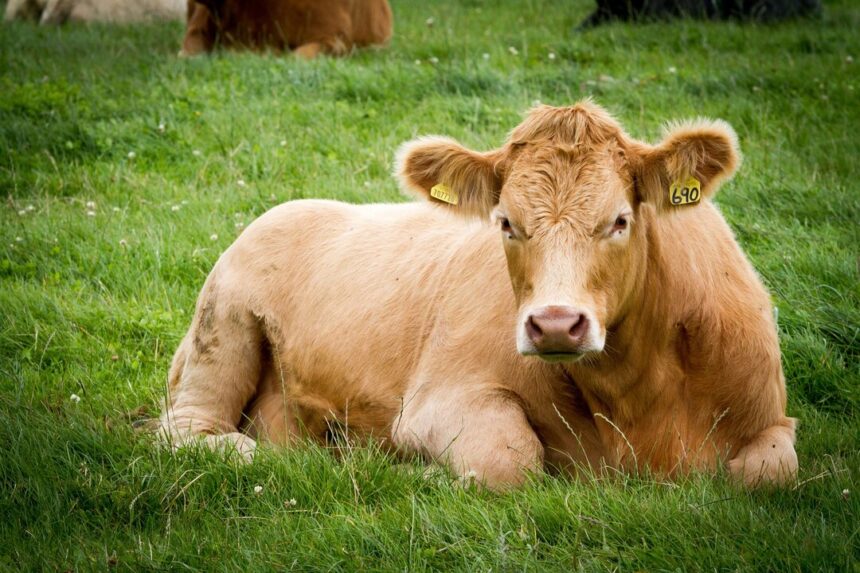Gelbvieh cattle, renowned for their superior genetics and adaptability, have become increasingly popular among livestock farmers in South Africa. Originating from Germany, these dual-purpose cattle are prized for their excellent maternal traits, growth efficiency, and meat quality. If you’re considering breeding and farming Gelbvieh cattle in South Africa, there are several key factors to consider. In this article, we’ll delve into 10 essential things you should know about breeding and farming Gelbvieh cattle in South Africa.
- Gelbvieh Characteristics:
Gelbvieh cattle are known for their distinctive golden-red coat color and muscular build. They are dual-purpose cattle, meaning they excel in both beef and dairy production. Gelbvieh cattle are renowned for their excellent maternal instincts, calving ease, and fast growth rates, making them an attractive choice for commercial cattle farmers in South Africa. - Adaptability:
One of the primary advantages of Gelbvieh cattle is their adaptability to various environmental conditions. Whether it’s the hot and arid climate of the Northern Cape or the cooler, temperate regions of the Western Cape, Gelbvieh cattle thrive in a wide range of climates and grazing conditions, making them well-suited to the diverse landscapes of South Africa. - Growth Efficiency:
Gelbvieh cattle are known for their efficient feed conversion and rapid growth rates. They have a well-muscled frame and good feed intake, allowing them to efficiently convert feed into lean muscle mass. This growth efficiency translates to reduced feeding costs and faster returns on investment for cattle farmers in South Africa. - Maternal Traits:
Gelbvieh cows exhibit excellent maternal traits, including high fertility, good mothering ability, and strong maternal instincts. They have a reputation for easy calving and low calf mortality rates, making them ideal for extensive grazing systems and cow-calf operations in South Africa. - Meat Quality:
Gelbvieh beef is highly regarded for its exceptional meat quality, characterized by tenderness, marbling, and flavor. The breed’s genetic predisposition to produce well-muscled, lean carcasses with minimal fat contributes to the superior quality of Gelbvieh beef, making it a sought-after choice among consumers and beef producers in South Africa. - Breeding Objectives:
When breeding Gelbvieh cattle in South Africa, farmers typically focus on improving specific traits such as growth rate, feed efficiency, maternal instincts, and meat quality. Selective breeding programs aim to enhance desirable traits while maintaining the breed’s adaptability and hardiness to local environmental conditions. - Health and Disease Management:
Like all livestock, Gelbvieh cattle require proper health and disease management to ensure optimal productivity and well-being. This includes regular vaccinations, deworming, parasite control, and preventive measures against common cattle diseases such as brucellosis, foot-and-mouth disease, and tick-borne illnesses prevalent in South Africa. - Grazing and Feeding:
Gelbvieh cattle are well-suited to both extensive grazing and intensive feeding systems. They thrive on a diet of pasture grasses, supplemented with high-quality forage and protein-rich feeds as needed. Proper grazing management and nutrition are essential for maximizing the breed’s growth potential and reproductive performance in South African farming operations. - Marketing and Sales:
The demand for Gelbvieh cattle and Gelbvieh genetics is growing steadily in South Africa, driven by the breed’s superior traits and performance. Cattle farmers can market Gelbvieh breeding stock, including bulls, heifers, and embryos, to other producers looking to improve their herds’ genetics and productivity. Additionally, Gelbvieh beef producers can capitalize on the breed’s reputation for quality meat by targeting niche markets and premium beef consumers. - Support and Resources:
For farmers interested in breeding and farming Gelbvieh cattle in South Africa, there are various resources and support networks available. These include breed associations, agricultural extension services, veterinary clinics, and online forums where farmers can access information, technical assistance, and networking opportunities to support their Gelbvieh farming endeavors.
Breeding and farming Gelbvieh cattle offer numerous opportunities for livestock farmers in South Africa. With their superior genetics, adaptability, and meat quality, Gelbvieh cattle are well-suited to the diverse landscapes and climatic conditions of the country. By understanding the essential aspects of Gelbvieh breeding, management, and marketing, cattle farmers can capitalize on the breed’s potential and contribute to the growth and sustainability of South Africa’s livestock industry.
Join 'Farmers Mag' WhatsApp Channel
Get the latest Farming news and tips delivered straight to your WhatsApp
CLICK HERE TO JOIN






